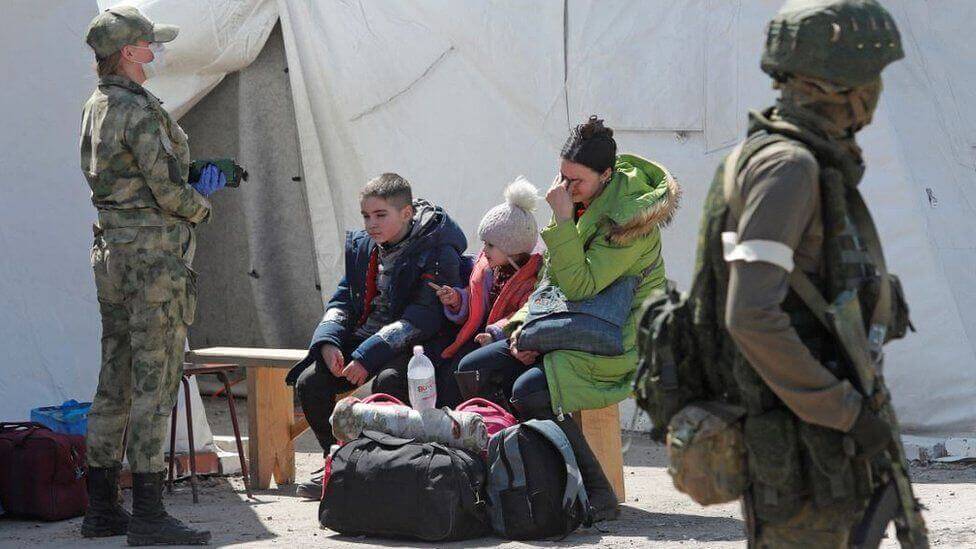The United Nations (UN) and the International Committee of the Red Cross (ICRC) began evacuating civilians from the Azovstal steel plant in the besieged Ukrainian port city of Mariupol over the weekend.
Evacuation of civilians from Azovstal began. The 1st group of about 100 people is already heading to the controlled area. Tomorrow we’ll meet them in Zaporizhzhia. Grateful to our team! Now they, together with #UN, are working on the evacuation of other civilians from the plant.
— Володимир Зеленський (@ZelenskyyUa) May 1, 2022
Ukrainian President Volodymyr Zelensky said on Sunday that a group of about 100 people have been evacuated from Azovstal and are on their way to Zaporizhzhia, a little more than 250 kilometres from Mariupol. Zelensky said the operations will continue and a Ukrainian team and UN staff will work together to help rescue other civilians stuck at the plant.
“I am also grateful to the ICRC for its role in the negotiations and the work of its teams in Mariupol,” he added.
Furthermore, the UN Office for the Coordination of Humanitarian Affairs (OCHA) spokesperson Saviano Abreu said in a statement on Sunday that a “safe passage operation” is ongoing in Mariupol under the coordination of the UN and the Red Cross. Abreu noted that Russia has also agreed to cooperate with the evacuation.
“It was agreed with both parties to the conflict that civilians who had been stranded for nearly two months in Azovstal—women, children and the elderly—will be evacuated to Zaporizhzhia where they will receive immediate humanitarian support, including psychological services,” the OCHA statement read.
The mission is a joint UN-Red Cross-Ukraine-Russia agreement, which is what Antonio Guterres discussed with Vladimir Putin in Moscow. The progress is unclear at this time. pic.twitter.com/sjbEAd3h8S
— Samuel Ramani (@SamRamani2) May 1, 2022
It further stated that operations began on Friday when a joint UN/ICRC convoy travelled from Zaporizhzhia to Mariupol. “As the operations are still ongoing, we will not provide further details at this point, to guarantee the safety of the civilians and humanitarians in the convoy,” Abreu said.
The Red Cross also said on Saturday that it was working with the UN and the parties to the conflict to address “the vast and growing humanitarian needs in Ukraine” and its team in on the ground in Mariupol. It said that it will not divulge further information. “Relevant local authorities are communicating with people in Mariupol about practical details,” the statement added.
The ICRC has previously expressed alarm about the worsening humanitarian situation in Mariupol and said that civilians in the port city are in dire need of assistance. “Immediate and unimpeded humanitarian access is urgently required to allow for the voluntary safe passage of thousands of civilians and hundreds of wounded out of the city, including from the Azovstal plant area,” the Red Cross said in April.
Principled and determined efforts with parties to the conflict & the @UN are hopefully starting to pay off for civilians trapped in #Azovstal plant & #Mariupol.
— Robert Mardini (@RMardiniICRC) May 1, 2022
Respect to our @ICRC_ua teams and all those involved in this life-saving humanitarian operation. https://t.co/TRiK2RpBSk
The operation in Mariupol began after efforts by UN Secretary-General António Guterres, who travelled to Moscow last week to meet Russian President Vladimir Putin and later met with Zelensky in Kyiv. The UN said that Guterres had reached an “in principle” agreement with Putin to facilitate evacuation operations by setting up a humanitarian corridor.
While in Moscow, Guterres also announced the formation of a Humanitarian Contact Group that would include officials from Russia, Ukraine, and the UN. The group’s primary job would include figuring out how to establish safe evacuation corridors and cease hostilities. To this end, Guterres emphasised the need for coordination between the UN, the Red Cross, and Russian and Ukrainian troops to address the crisis in Mariupol.
This is how Mariupol civilians emerged from under the Azovstal steel works to flee the ruined city in UN-led evacuation. 100+ women and children were evacuated and are expected to reach Ukraine-controlled Zaporizhia tomorrow morning. Video by MP David Arakhamia via Azov regiment pic.twitter.com/JSY5GCgsWu
— Myroslava Petsa (@myroslavapetsa) May 1, 2022
Since beginning its invasion of Ukraine on February 24, Russia has been fighting to seize control of Mariupol due to its strategic location. Capturing the port city, which borders the Sea of Azov, will allow Moscow to establish a naval corridor from Crimea to Donbas.
Earlier this month, Russia claimed that it had taken the entire city of Mariupol, except for the Soviet-era Azovstal steel plant, where the last Ukrainian survivors of the Russian siege, both soldiers and civilians, have been holed up. Following Russia’s relentless bombing campaign, the ICRC called the situation in Mariupol “apocalyptic.” In fact, the Ukrainian government has claimed that over 95% of the city has been destroyed. The death toll in Mariupol is estimated to be somewhere between 10,000 to 20,000; however, there has been no reliable figure till now.

